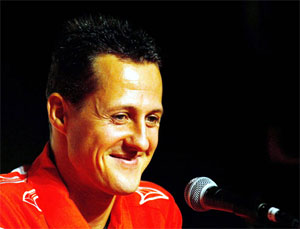Apr 15, 2025
Apr 15, 2025
 The final race said it all. He knew the odds were completely against him, yet that didn't deter him from giving his best, illustrated in the resoluteness he displayed throughout the race. Having started tenth at the grid due to technical problems in the qualifier, he very soon raced to the sixth spot and to the 4th position before he started to slide. A left-rear puncture saw him limp back to the pits and when he rejoined, it was in the 19th position. Those watching the race live - in person and on television - would have given up right there and then. But not this seven-times champion. He immediately picked up speed, flying by the slow-movers and was back at the sixth position in no time. His progress may have been slightly impaired by Fisichella and Raikkonen but for one last time the man showed why he was still a force to reckon with. Result - fourth position in a race that was to be his last hurrah.
The final race said it all. He knew the odds were completely against him, yet that didn't deter him from giving his best, illustrated in the resoluteness he displayed throughout the race. Having started tenth at the grid due to technical problems in the qualifier, he very soon raced to the sixth spot and to the 4th position before he started to slide. A left-rear puncture saw him limp back to the pits and when he rejoined, it was in the 19th position. Those watching the race live - in person and on television - would have given up right there and then. But not this seven-times champion. He immediately picked up speed, flying by the slow-movers and was back at the sixth position in no time. His progress may have been slightly impaired by Fisichella and Raikkonen but for one last time the man showed why he was still a force to reckon with. Result - fourth position in a race that was to be his last hurrah.
29-Oct-2006
More by : Yamini Ayyagari